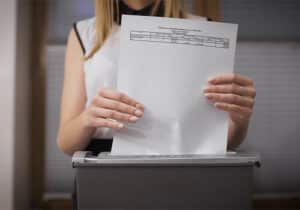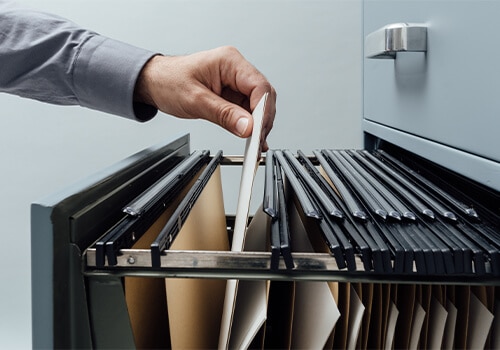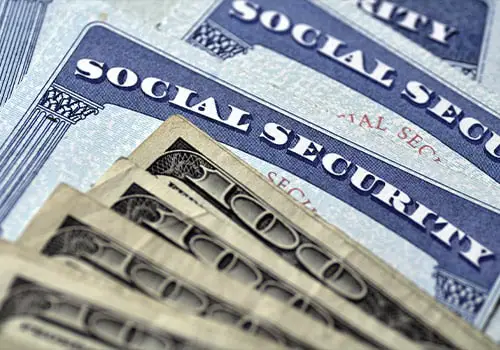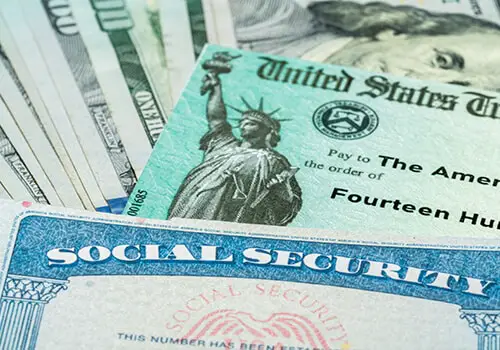Are you wondering how long you should retain your tax records? Do you have a pile of old tax records sitting in your home, just taking up space and collecting dust?
Most taxpayers know they need to keep these old tax returns, but many are unsure how long they need to keep them. Many end up just keeping them indefinitely, although that is not necessary!
So, just how long do you need to keep them and how should you dispose of them?
We will explain everything you need to know about keeping those old tax returns, including how long you should keep them, the best methods for storing them, and how to properly dispose of them.
How Long To Keep Your Tax Records
Now that you have filed your income taxes, how long do you need to keep those old records? You should keep your tax returns for at least three years from the date you filed the return or two years from the date you paid the tax, whichever is later.
This is the retention period for old returns, without special circumstances. In some situations, the IRS requires you to keep your returns for over three years.
Here are some examples of situations in which you must keep your returns longer than the standard three-year statute of limitations.
- If you file a claim for a loss from worthless securities or a bad debt deduction, you must keep your returns for seven years.
- If you do not file a return or you file a fraudulent return, then you need to keep your records indefinitely.
- Employment tax records must be kept for four years. If your business has a deferred tax liability, you might need to retain your records for a certain period from when the tax is paid.
Your filing status, such as married filing separately, generally does not affect how long you need to keep your records.
You must keep copies of your tax returns and all records associated with them.
- This includes but is not limited to receipts, bank statements, brokerage statements, IRA information, canceled checks, credit card statements, business expense documentation, and any other documents related to your tax filing.
- If you are self-employed, you must keep everything related to your business.
- If you are subject to an IRS audit, you need to be able to provide all the supporting documentation for your tax return to prove the validity of it.
Since the coronavirus pandemic caused the tax filing due date to be adjusted for 2020, you should know that the change could affect how long you need to keep your old records.
KEY TAKEAWAYS
- As a general rule, you should keep your tax returns for at least seven years. However, there may be instances where you need to keep them longer.
- You can choose to store paper or elecrtronic copies of your tax returns, most people find it easier to store a copy electronically because it takes up less space and can be easily search for specific timeframe.
- If you file an amended return, you should retain a copy of the original and amended return.
IRS Period Of Limitations
The IRS period of limitations is the amount of time you must keep your return. It is also the time period in which you can amend your return to claim a refund or additional tax credit, or the IRS can assess additional tax.
The IRS has precise rules that identify the period of limitations for different situations. This period may be two years, three years, four years, six years, seven years, or even indefinitely in some situations.
You must retain your tax documents for the time specified by the IRS for your situation.
- If you find it too difficult to remember the details of all the different periods, then you should keep your returns for seven years. This is the most prolonged period required for any records except those relating to real property.
Unless you did not file a return or filed a fraudulent one, you should keep your records indefinitely.
- With records becoming easier to store electronically today, some people simply keep all their records indefinitely.
While the Internal Revenue Service does not require this in most cases, nothing prohibits you from doing this. It also makes it easy to go back and review your old records if you need them in the future.
Many ask, “How many years can you file back taxes?” In most cases, if you did not file a return, you can file back taxes at any point in the future.
Whether you can still claim a tax refund for that year depends on your situation. If you have questions about how long you should retain specific records or whether you can still file back taxes, you can always ask your CPA for help.
Must read articles related to Taxes
- What are the benefits of married filing separate?
- Are you required to file taxes?
- Reducing college expenses with the American Opportunity Credit.
- Check the status of your state refund.
- The ins and outs of OASDI tax.
Tax Returns Related To Property
Income tax returns related to property have slightly different rules. This rule applies to any real property that you might own.
- It could be your home, a rental home, or other property you might own.
You must keep these records until the period of limitations expires for the year in which you dispose of the property.
So, if you own a rental property and report gross income from that property on your returns for 20 years, you may have some returns that you must keep for over 20 years.
The returns must be kept because they must be used to figure depreciation, amortization, the depletion deduction, and any capital gains you may experience from the sale of the property.
- You must keep those records even longer if you acquired property or real estate through a nontaxable exchange.
You must keep all the records from both the new and old property until the period of limitations expires for the year you dispose of the new property. These records must be kept to prove your tax basis on the property.
Any gains calculated from the property are not always as simple as subtracting the purchase price from the sales price.
State Tax Retention Requirements
So far, we have mostly discussed the IRS retention requirements for your old tax returns. However, remember that you will also need to keep your state tax returns.
- The rules vary by state, so keeping state returns for the same period as your Federal return is generally a good idea.
Some states, like California, have up to 4 years to audit your old returns. This means that you should keep all your records associated with those returns for at least four years.
- If you file an amended return, make sure that you keep both the original return and the amended one.
If you decide to keep all your records indefinitely like some people, you should not worry too much about the state tax requirements.
Many of the documents you will need to keep with your returns will be the same, so you should already have them covered. Just make sure that you keep those state tax returns along with that documentation.
TIP
When selling or disposing of a computer, ensure all personal files (like tax returns) are correctly removed from the hard drive. Deleting them often will not suffice, as they remain stored elsewhere on the drive.
Storing Your Tax Documents
The question often arises of how the documents need to be stored. Do you need to keep hard copies of them all or will electronic copies suffice?
Keeping a hard copy of your return is actually not necessary. Many people now choose to store them electronically for many reasons.
- First, it does not take up a lot of space in your office. Years ago, you needed filing cabinets or document boxes to store all the paper records associated with your tax returns.
However, you can scan all your records today and keep an electronic copy. It makes things much more straightforward.
- Using tax software like TurboTax makes it easy to get electronic copies of your returns.
You will simply need to convert your supporting documentation into electronic versions.
It can also make it easier to retrieve the documents you need because you can easily separate them by tax year or any other method you like. In addition, keeping these records for tax purposes indefinitely is relatively easy. Once the documents are stored electronically, they can easily stay there forever.
There are a few things to remember when storing digital copies of your records.
- First, make sure that you keep a regular backup. Not many things would be worse than losing several years’ worth of tax returns because your computer crashed.
- If you store your documents in the cloud, ensure your cloud provider encrypts your data. Those old records contain your Social Security number and other critical financial data.
You do not want to open yourself up to identity theft or some other crime by storing all your personal information in an unsecured location.
Disposing Of Old Tax Returns

So, you have finally reached the period of limitations on some old returns and are ready to dispose of them. What now? What is the appropriate method for getting rid of those old returns?
You should not simply throw your old documents into the trash. A criminal could obtain way too much sensitive data and personal information.
You should shred these documents before disposing of them. Make sure you use a shredder that cuts them into fine pieces so that someone cannot easily reassemble the documents to obtain your personal information.
If you store your electronic documents on an old computer, remember those documents and records might still be accessible even though you think you have deleted them.
If necessary, you should consult a computer expert to ensure that the files are completely removed from your PC before you give them to someone else.
The Bottom Line
Keeping your old tax returns can be a pain, but it is a necessary requirement laid out by the IRS.
The time you must keep them varies depending on your specific situation. If you store your records electronically, it is easy enough to keep them indefinitely.
This ensures that you comply with the IRS requirements, and you can view your past documents should you need to access them at any point in the future. If the IRS comes back and says that you have some additional tax liability, you must have your records to prove your case.
Many people choose to keep all records related to their personal finances, not simply their tax records. Although this is not required, it is generally a good idea.
Frequently Asked Questions
Generally, the IRS does not audit returns that are more than seven years old. However, there are a few instances where they do have the authority to go back longer than this.
If you file a fraudulent or fail to file a return, they can go back more than seven years. You must keep any records related to those situations indefinitely.
They could technically go back more than ten years to investigate those cases and assess the taxes that might have been due.
Yes! You are required to keep your old tax returns for at least three years in most cases. In some situations, you need to keep your returns for even longer.
In addition to your returns, you must keep all the supporting documents that went along with those returns. If the IRS decides to audit your returns, you will need all that documentation to prove that you filed your returns correctly.
It depends on your specific tax situation for a given tax year. You must usually keep your returns for at least three years.
However, there are some instances where you must keep the returns for up to 7 years or even indefinitely!
The IRS period of limitations explains precisely how long you must keep your returns for each situation. If unsure, you can always ask your CPA or keep the returns indefinitely.
The IRS statute of limitations in the most basic case is three years. If you claim a tax refund or deductions from worthless securities or bad debt, that period increases to 7 years.
They have a statute of limitations on employment tax records of 4 years. Maybe you’re wondering, “Do I have to file taxes?” If you improperly fail to file a tax return, then there is no limit to the statute of limitations for the IRS.
The period varies based on your specific tax situation, but the IRS rules state how long the period lasts for each situation.
If you have lost or misplaced your old records, then maybe you are wondering how to get a copy of my tax return.
If you use tax software, then you should be able to obtain copies of your prior records from the software on your computer.
If you use a CPA for your taxes, then they likely have copies of your old records that they can provide.
You can also contact the IRS and obtain copies of your old tax returns. You can order them online, by mail, or over the phone.
You can find a Social Security Administration office near you by using our SSA office locator and searching for your closest location.





